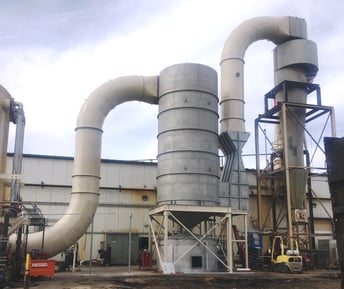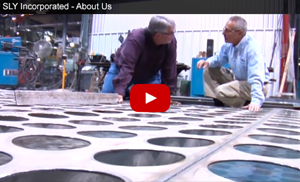A wet scrubber is an effective means of cleaning or “scrubbing” particulates and chemicals from industrial exhaust gases. Because wet scrubbers use water or a water-based solution to collect pollutants from the exhaust stream, plant managers view the equipment as more complex than dry dust collection systems.
While there may be more engineering complexity, wet scrubbers typically have lower operating costs than dry systems, and sometimes they have equal or lower upfront costs as well. What’s more, in many situations, a wet scrubber is the only technology that will achieve the desired results. That’s why company managers who are considering a wet scrubber should know the pros and cons of web scrubbers and how they apply to their specific applications. This blog post can help.
than dry systems, and sometimes they have equal or lower upfront costs as well. What’s more, in many situations, a wet scrubber is the only technology that will achieve the desired results. That’s why company managers who are considering a wet scrubber should know the pros and cons of web scrubbers and how they apply to their specific applications. This blog post can help.
Advantages of Wet Scrubbers
Safely handle combustible dust.
In applications involving combustible dust, a wet scrubber completely eliminates the risk of an explosion in the scrubber. The risk depends on the type of dust, particulate size, temperature, and concentration. Our client that literally makes explosives understands the extreme consequences of combustion and opted for a wet scrubber. An application involving corn starch or sugar—dusts that can be explosive in the right conditions—are handled safely with a dry system if the concentrations are low enough and if ignition sources are not present.
Managers need to weigh the potential consequences of an industrial accident, which include OSHA fines, litigation, and medical costs, against the additional cost of a wet scrubber. The only way to avoid the risk completely is with a wet system.
Remember dry systems that handle combustible dusts are required to have safety equipment that adds to the cost of the system. Poor maintenance is a major factor in dust-related explosions; the cost of ongoing maintenance should be included in the risk-benefit analysis.
Save space.
Wet scrubbers consume less space in the plant. Unlike baghouses and cartridge collectors with associated ductwork, wet scrubbers have a compact footprint. When space in a facility is precious, size is a critical factor.
Handle sticky or abrasive dust.
We hear from customers who have abandoned their baghouses because of sticky material that quickly blinds filters and increases cost in the form of labor and replacement filters. Wet scrubbers have no filters to replace. Abrasion is another consideration. Abrasive particulate can cause excessive wear of dust collectors, conveyors, and rotary valves, shortening their service life. For a sand dryer application, our customer found it is better to collect the dust in water and then pass the water through a filter that separates the sand from the water.
Remove unwanted soluble gases.
When wet scrubbers force gas and water together, gas passes through the water leaving the particulate behind. Soluble gases, however, don’t pass through but rather absorb into the water, enabling their removal from the waste stream. Waste gases that are commonly removed from industrial processes include chlorine, ammonia, and hydrochloric acid. Wet scrubbers also remove water-soluble odors. In contrast, dry dust collection systems do not remove gases and odors.
Remove fine particulate and mists.
Wet scrubbers are extremely efficient, removing up to 99% of particulates, including particulates too small to be caught in baghouse and cartridge filters. Scrubbers with ultra-fine droplets entrap tiny particles and hold them in the solution for removal. Mists can entrain small particles, so if the pollutant is a mist, a wet scrubber will perform when a dry dust collection system can not.
Minimize maintenance.
Very little maintenance is required of a wet scrubber. The only regular maintenance required is to change the scrubber water regularly. It’s like mopping a floor. The floor will get only as clean as your mop water. In the same way, process water should be replaced as needed to meet pollution control targets. The frequency of maintenance will depend on the CFM of the system, the amount of particulate in the influent gas, and the PPM targets required of the effluent gas.
Disadvantages of Wet Scrubbers
Potential higher cost.
Often, a wet scrubber costs more than a dry dust collection system. This is mainly because a liquid solution is more corrosive than dry dust, so wet scrubbers must be constructed of stainless steel. In contrast, a baghouse, cartridge collector, and dust cyclone may be made of cheaper carbon steel. In some applications, depending on the nature of the particulate, a dry dust collection system may also need to be made in stainless steel, which diminishes the cost advantage.
Difficulty of wet waste disposal.
A dry system is better if the process water cannot be discharged into the sewer. As a wet scrubber collects contaminants, the water gets dirty and must be changed. A case in point is a company making spices. It assumed its process water was compatible with the municipal sewer system, but the municipality disagreed. Suddenly the processor had to switch to a dry scrubber system in which waste could be collected in 55-gallon drums and removed for disposal in a landfill.
Pay higher energy costs.
A wet system has higher energy costs than a dry system because the differential pressure must be higher, especially with venturi scrubbers. In order to mix the exhaust gas with the water, significant motive force must be applied via high-horsepower fans. Compared to a dry dust collection system that merely moves gas through a filter, a wet scrubber adds more to the electric utility bill.
Seek Advice From an Expert
Like so many engineering decisions, it is essential to have a complete picture before selecting a pollution control technology. Most plant managers don’t know what they don’t know, so they should get advice from an experienced industry consultant or scrubber manufacturer. Because they see a wide range of applications, they know which questions to ask in order to have a comprehensive understanding of the system needs and whether a wet scrubber’s advantages outweigh the disadvantages in a particular situation. Call Sly today to discuss your application with an expert.
Tags: wet scrubber




